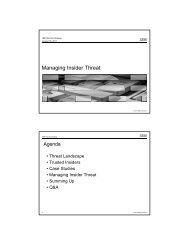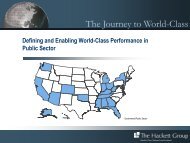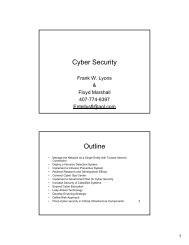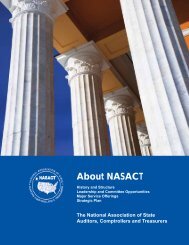Advisory Committee on Tax Exempt and Government Entities (ACT ...
Advisory Committee on Tax Exempt and Government Entities (ACT ...
Advisory Committee on Tax Exempt and Government Entities (ACT ...
You also want an ePaper? Increase the reach of your titles
YUMPU automatically turns print PDFs into web optimized ePapers that Google loves.
The Appropriate Role Of The Internal Revenue Service With Respect To <strong>Tax</strong>-<strong>Exempt</strong> Organizati<strong>on</strong> Good Governance IssuesThe c<strong>on</strong>ceptual advantages of state supervisi<strong>on</strong> of n<strong>on</strong>profit governance are manifest.The duties of care <strong>and</strong> loyalty imposed up<strong>on</strong> n<strong>on</strong>profit board members <strong>and</strong> otherfiduciaries that are the foundati<strong>on</strong> of good governance are evolving matters of state law.These duties are rarely expressed as “bright lines” that forbid certain acti<strong>on</strong>s <strong>and</strong>m<strong>and</strong>ate others, but rather are relative st<strong>and</strong>ards that invite comparis<strong>on</strong> to others insimilar positi<strong>on</strong>s in comparable subsectors <strong>and</strong> geographical areas. What passes foradequate board c<strong>on</strong>duct in <strong>on</strong>e part of the country may be an anathema to the public inanother, given the diversity of n<strong>on</strong>profit activity <strong>and</strong> the variety of governance practicesaround the country. Local regulati<strong>on</strong> respects those differences <strong>and</strong> allows innovati<strong>on</strong>even as it accords discreti<strong>on</strong> to the overseers in the offices of the attorneys general todefine the boundaries of acceptable c<strong>on</strong>duct through individual enforcement acti<strong>on</strong>.Where acti<strong>on</strong> is appropriate, states generally are closer to the activity <strong>and</strong> more able tobe resp<strong>on</strong>sive. State regulati<strong>on</strong> <strong>and</strong> supervisi<strong>on</strong> also promotes experimentati<strong>on</strong> am<strong>on</strong>gstates, allowing for individual states to experiment <strong>and</strong> for other states to then see whatworks. More importantly, the equitable powers invested in state courts <strong>and</strong> the power ofthe state attorneys general, unknown in the federal tax code but historic <strong>and</strong> l<strong>on</strong>gst<strong>and</strong>ingin the states, generally permit soluti<strong>on</strong>s to malfeasance <strong>and</strong> n<strong>on</strong>feasance,such as the removal of miscreant board members, that are tailored to the violati<strong>on</strong>s oflaw <strong>and</strong> minimize depleti<strong>on</strong> of the very assets that the enforcement acti<strong>on</strong>s aredesigned to protect. 51The incursi<strong>on</strong> of the IRS into matters of n<strong>on</strong>profit governance bey<strong>on</strong>d enforcement ofthe tax laws represents a departure from that l<strong>on</strong>g-st<strong>and</strong>ing divisi<strong>on</strong> of authority,notwithst<strong>and</strong>ing its gradual erosi<strong>on</strong> over the past 40 years. The IRS has <strong>on</strong>ly limitedformal enforcement tools—revocati<strong>on</strong> of exempti<strong>on</strong>, <strong>and</strong> in certain cases the ability toassess excise taxes. Moreover, any effort to impose a uniform set of federal st<strong>and</strong>ardsrisks obstructing the evoluti<strong>on</strong> that is so critical to the sector. At the same time,however, we recognize the persistently limited resources devoted to charities’ regulati<strong>on</strong>by the states has encouraged an exp<strong>and</strong>ed role for the IRS in promoting str<strong>on</strong>gern<strong>on</strong>profit governance. Although charitable fundraising is subject to regulati<strong>on</strong> in 39states, few but the most active states devote significant staffing to charities’ oversight,including oversight of n<strong>on</strong>profit governance, a pattern that has remained unchanged inmore than thirty years. 52 At the same time, the enforcement staffs in even the mostactive states are increasingly disproporti<strong>on</strong>ate to the number of charities operating <strong>and</strong>soliciting in their jurisdicti<strong>on</strong>s as the n<strong>on</strong>profit sector has grown dramatically in recentdecades. 53 We also recognize the geographically expansive nature of n<strong>on</strong>profit activity,without regard to state borders, that makes federal involvement more attractive. The51For example, New York Not-for-Profit Corporati<strong>on</strong> Law § 706(d) provides “an acti<strong>on</strong> procuring a judgment removing a director maybe brought by the attorney general or by ten per cent of the members, whether or not entitled to vote.” See also, Adelphi Universityv. Board of Regents of the State of New York, 229 A.D. 2d 36 (App. Div. 3 rd Dept. 1997)(board of regents of state educati<strong>on</strong>department properly delegated authority under educati<strong>on</strong> law to private parties to bring proceeding to remove trustees for permittingexcessive compensati<strong>on</strong> to CEO <strong>and</strong> unlawful self-dealing by trustees).52David Biemesderfer & Andras Kosaras, The Value of Relati<strong>on</strong>ships Between State Charity Regulators <strong>and</strong> Philanthropy (2006),at. 4.53New York, for example, has the largest charities enforcement staff in the country, with more than 20 attorneys. However, the NewYork Attorney General’s website states that New York has almost 50,000 charitable organizati<strong>on</strong>s registered to operate <strong>and</strong>/or solicitfunds within its borders. http://bartlett.oag.state.ny.us/Char_Forms/search_charities.jsp.ADVISORY COMMITTEE ON TAX EXEMPT AND GOVERNMENT ENTITIES (<strong>ACT</strong>) June 11, 2008 19













